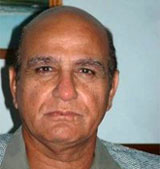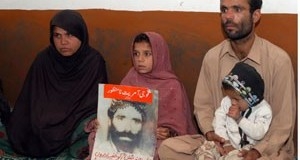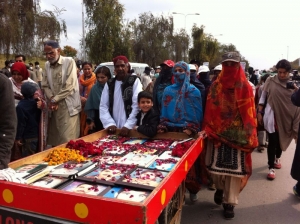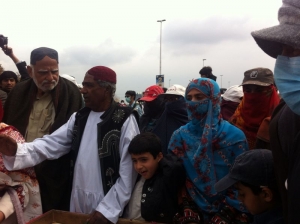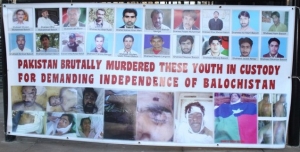The truth however is that if you do not feel the pain of others you are not quite well. Empathy with the forcibly disappeared persons and their relatives could result from seeing their sufferings first hand or learning about it from the media. The personal contact with the relatives of the disappeared who have now been observing a token hunger strike for nearly 900 days is hazardous as the intelligence agencies keep a close watch to discover sympathisers and supporters. People have been picked up and threatened for showing support. As for the media, it conveniently ignores the disappeared persons’ plight, which is pathetic, to say the least.
Apparently, in principle society and the media generally believe and follow the dictum of the misattributed Stalin quote: “The death of one man is a tragedy; the death of millions is a statistic.” It quite poignantly reflects their attitudes. Rimsha Masih deservedly got the backing of civil society and the media but unfortunately, the thousands who have been disappeared and hundreds who have been killed in Balochistan are just statistics that do not deserve civil society sympathy or a mention in the media even on the International Day for Disappeared Persons. Human sufferings should never be allowed to become mere statistics, and wherever these do become just these, it proves to be fatal for that society.
The International Convention for the Protection of All Persons from Enforced Disappearance (ICCPED) was adopted by the United Nations General Assembly on December 20, 2006. Of the 91 signatory states, 32 have ratified or acceded to it. Pakistan has so far refused to sign it and the possibility seems remote as ever because they still have unfinished business in Balochistan.
A delegation of the UN Working Group on Enforced or Involuntary Disappearances will visit Pakistan from September 10th to 20th. Hopefully, it will be third time lucky because already twice its visits were cancelled and until it actually materialises, its fate remains in the balance. Naturally, Pakistan fears such visits because the relatives of the disappeared would present the evidence that unquestionably holds the Frontier Corps and the intelligence agencies responsible for the disappearance and consequent dumping of their tortured bodies. The Supreme Court is on record as holding the above mentioned organisations responsible for the enforced disappearances.
The latest HRCP report states that the situation in Balochistan has worsened considerably. Incidentally, Pakistan dismisses human rights organisations’ reports as part of a conspiracy and often invokes the insurgency as an exceptional circumstance as justification for brutality. It is pertinent to note that enforced disappearances, even in exceptional circumstances like a state of war or a threat of war, internal political instability or any other public emergency without due process constitute crimes against humanity.
The present circumstances in Balochistan have arisen because an intransigent state is bent upon depriving the Baloch people of their rights and resources and consistently attempts to crush the dissent that the illegality of its actions have given rise to. Since March 27, 1948, the Baloch have been struggling to regain their usurped rights and have been struggling to thwart the illegal exploitation of their resources and have been paying a heavy price for the defence of their rights. The world at large and the people here have been silent spectators to state atrocities and this has encouraged the state to perpetrate injustices with impunity.
The Baloch undoubtedly have suffered the most from the Pakistan’s systematic ‘dirty war’ of disappearing and killing, aimed at crushing the popular movement for the Baloch right to liberty. Sindhis too are now being frequently targeted. The Khyber Pakhtunkhwa people also have had their share of disappeared persons and people regularly die in custody; so far 122 have died.
Zakir Majeed, who was abducted from Mastung on June 8, 2009, remains missing. Munshi Mohammad Bakhsh Baloch, a 75-year-old farmer, is missing since June 20 and Dr Akbar Marri, a former student of mine, is missing since 2010. The list is endlessly long as thousands have gone missing while some 600 of them are no longer missing because their tortured and mutilated bodies were dumped all over Balochistan to intimidate those daring to oppose the highhandedness of the state.
The missing persons’ saga has a personal meaning for me because 16 of my former students, whom I taught during our long stay in Afghanistan, were abducted and their badly tortured bodies were dumped. The Pakistani state is conducting an open-ended dirty war against the Baloch people and no one is exempted from its brutality.
The issue of enforced disappearances in Balochistan has become the most serious threat to the already under-threat rights of the Baloch. Dissent, however mild, carries grave consequences and this affects all aspects of political, economic and social life there. The enforced disappearances for the Baloch are an issue on which there can be no compromise and the only option that they see to ending it is to break the bondage which not only keeps them shackled but continues to take a toll of lives in their prime. They seem determined to pay the ultimate price to end the injustices forever.
The writer has an association with the Baloch rights movement going back to the early 1970s. He tweets at mmatalpur and can be contacted at mmatalpur@gmail.com

